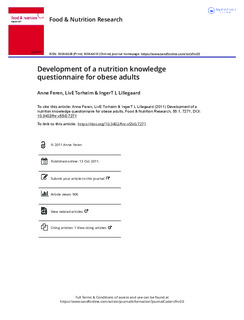| dc.contributor.author | Feren, Anne | |
| dc.contributor.author | Torheim, Liv Elin | |
| dc.contributor.author | Lillegaard, Inger Therese L. | |
| dc.date.accessioned | 2019-10-09T12:37:18Z | |
| dc.date.available | 2019-10-09T12:37:18Z | |
| dc.date.created | 2011-12-16T09:55:48Z | |
| dc.date.issued | 2011 | |
| dc.identifier.citation | Food & Nutrition Research. 2011, 55 . | nb_NO |
| dc.identifier.issn | 1654-6628 | |
| dc.identifier.uri | http://hdl.handle.net/11250/2621195 | |
| dc.description.abstract | Background and objective: The aim of this study was to develop a questionnaire for assessing nutritional knowledge among overweight adults. The questionnaire should reveal knowledge about current dietary recommendations, sources of nutrients, everyday food choices, and conditions related to overweight. Design: The first draft of the nutrition knowledge questionnaire (113 items) was based on literature review. To ensure content validity and expert-assessed face validity, an expert panel examined the questionnaire. Thereafter, the questionnaire was tested for user friendliness and ambiguity by five students. The questionnaire was pilot tested in a group of obese adults, similar to the target group. The results were analyzed for item difficulty and internal consistency and comments made by respondents were taken into account. Two student groups, differing in nutritional expertise, answered the questionnaire on two occasions to test construct validity and test-retest reliability. After the retest, a total overview of the questionnaire was made by the expert panel. The final questionnaire consisted of 91 items. Subjects: The pilot study was conducted in obese adults waiting for a gastric bypass operation (n=33). Construct validity (n=34) and test-retest reliability (n=27) was tested in two student groups: public health nutrition students and construction students. Results: Results from the pilot study showed that internal consistency of the three first sections together was 0.84, measured by Cronbach’s ?. Test of construct validity showed that public health nutrition students scored significantly better than construction students (p<0.001 for all sections), and test-retest reliability for all sections together was 0.82 (Pearson’s r). Conclusion: The knowledge questionnaire had reasonable content-, face-, and construct validities and overall good reliability. The questionnaire can be a useful tool for measuring nutrition knowledge among obese adults. | nb_NO |
| dc.language.iso | eng | nb_NO |
| dc.publisher | Taylor & Francis | nb_NO |
| dc.relation.uri | http://www.foodandnutritionresearch.net/index.php/fnr/article/view/7271/12468 | |
| dc.rights | Navngivelse-Ikkekommersiell 4.0 Internasjonal | * |
| dc.rights.uri | http://creativecommons.org/licenses/by-nc/4.0/deed.no | * |
| dc.title | Development of a nutrition knowledge questionnaire for obese adults | nb_NO |
| dc.type | Journal article | nb_NO |
| dc.type | Peer reviewed | nb_NO |
| dc.description.version | publishedVersion | nb_NO |
| dc.source.pagenumber | 7 | nb_NO |
| dc.source.volume | 55 | nb_NO |
| dc.source.journal | Food & Nutrition Research | nb_NO |
| dc.identifier.doi | 10.3402/fnr.v55i0.7271 | |
| dc.identifier.cristin | 869007 | |
| dc.description.localcode | This work is licensed under a Creative Commons Attribution 4.0 International License Authors retain copyright of their work, with first publication rights granted to SNF Swedish Nutrition Foundation. | nb_NO |
| cristin.unitcode | 194,66,15,0 | |
| cristin.unitname | Institutt for bioteknologi og matvitenskap | |
| cristin.ispublished | true | |
| cristin.fulltext | original | |
| cristin.qualitycode | 1 | |

